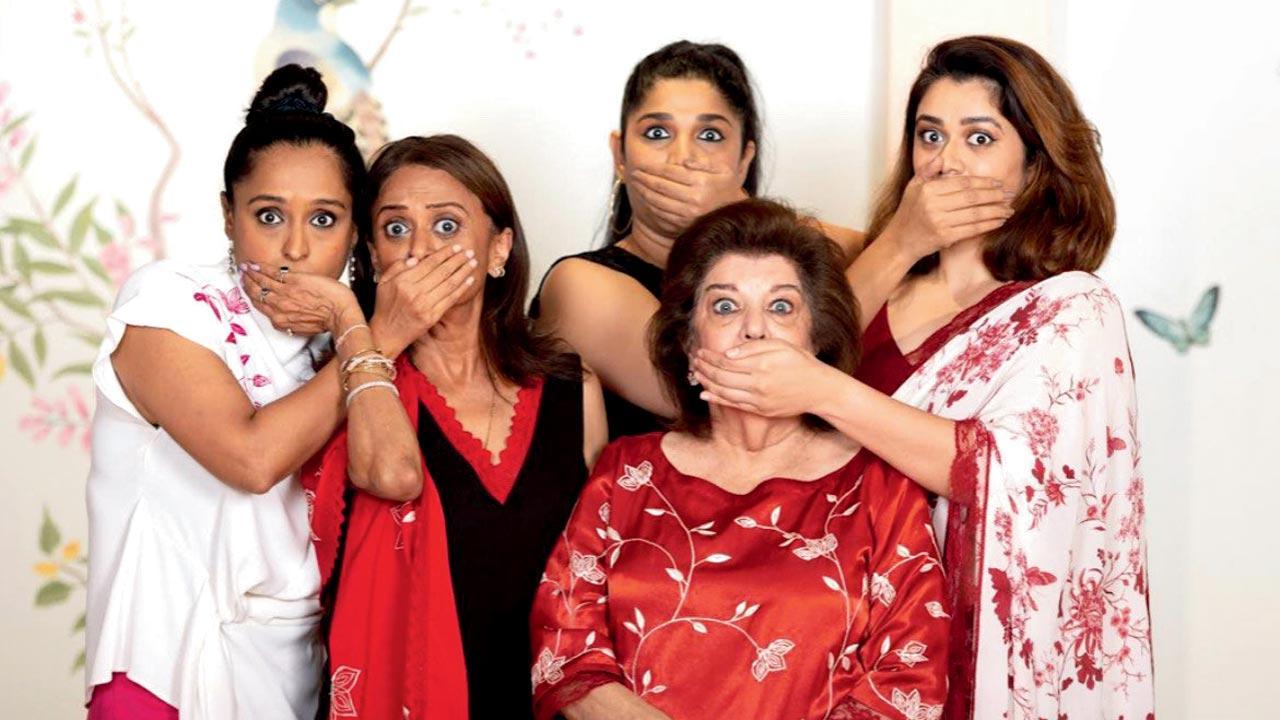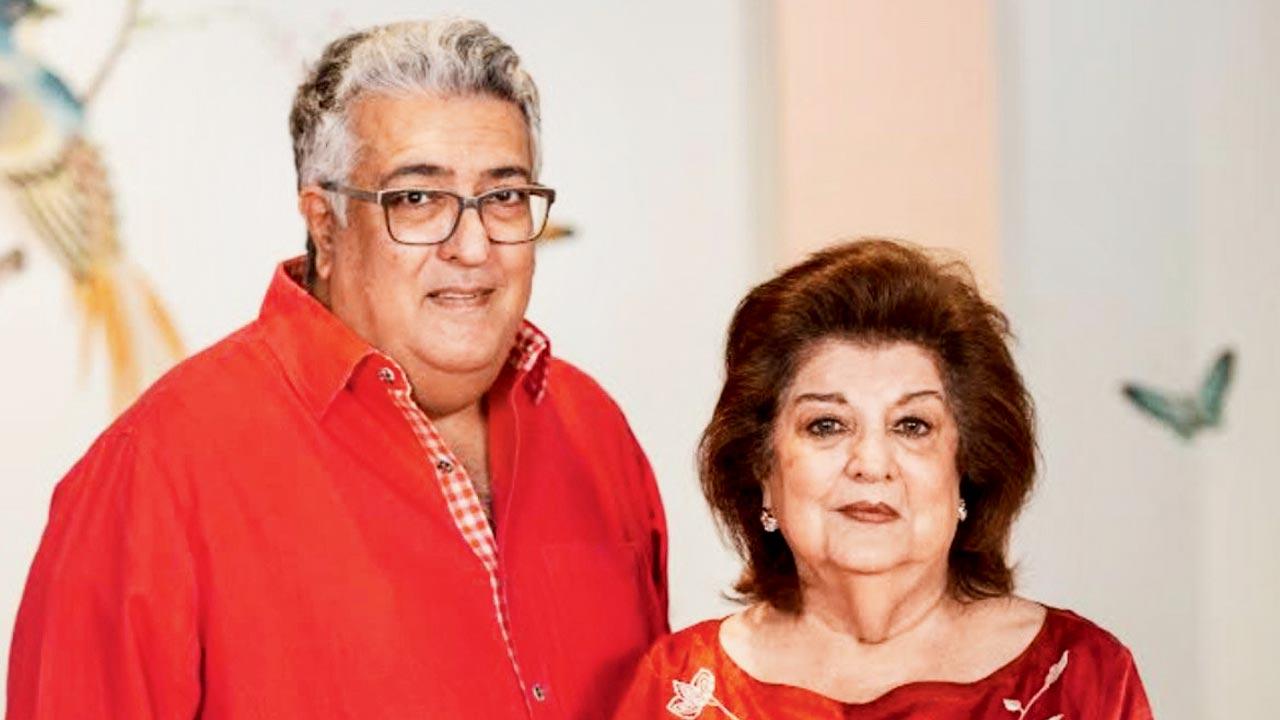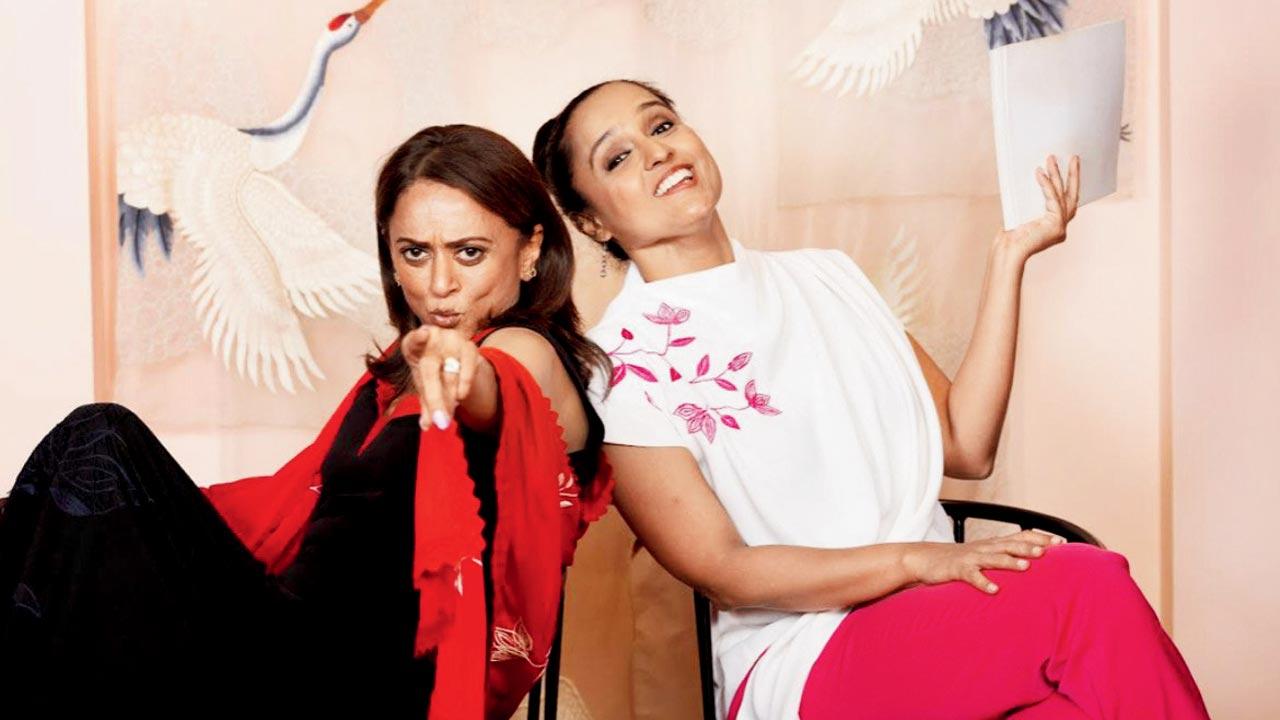After being the voices the monologues of our collective vaginas for more than two decades in Hindi and English, Mahabanoo Mody-Kotwal and Son will now be its Gujarati ventriloquists

Designer Ashdeen Lilaowala has hidden a clever code in the costumes of the cast for the Gujarati version of the play starring Mahabanoo Mody-Kotwal, Kruttika Desai, Girija Oak, Swati Das, and Devaki Markus
Debuted on the Indian stage in March 2003, it will be in its 22nd year soon and speaking in Gujarati. After English and Hindi, The Vagina Monologues—the ground-breaking play by V, formerly known as Eve Ensler—that celebrates the vagina, gives it a voice to speak of the various celebrations and acts of brutality heaved upon it, will now be performed in Gujarati.
ADVERTISEMENT
We’re sitting in on a reading at Mahabanoo Mody-Kotwal’s home in Churchgate with actors Swati Das, who has been associated with the play for 10 years, doing its Hindi and English versions, and Girija Oak-Godbole, whose mother tongue is Marathi, but started off her career in Gujarati theatre and obsessively observes how accent changes with regions. The Jawan-star was raised in Kandivli, in the heart of Gujarat’s suburban outpost. She’s been having fun recreating the Surti accent with its “hu” instead of “shu” and a Kathiawadi lilt.
 Kaizaad Kotwal was the one to introduce mother Mahabanoo to the play, and has been co-director and producer of all the Indian versions
Kaizaad Kotwal was the one to introduce mother Mahabanoo to the play, and has been co-director and producer of all the Indian versions
Das, a Filmfare-nominee, comes from Bengali and Tamil heritage, but spent her formative years in Gujarat, which is coming in handy. However, because she is so well-versed in the Hindi and English performances, she lapses into them during rehearsals and says there is no room for improvisation, as she does not “think in Gujarati”. She’s sticking to an Amdavadi accent.
The other actors, who will join them through video-calls are Amdavad-based radio jockey and actor Devaki Markus, and veteran TV and stage actor Kruttika Desai.
It was translator Chirantana Bhatt’s job to find what the vagina is called in Gujarati: Yoni, is the formal term as it is in Sanskrit. “Munni is common,” says Das, “also pikku/pikki in some places; su-su, as in the dirty place of bodily emissions.” And she had to retain the undulating cadence of the script as it weaves through the liberating moans of a lawyer-turned-sex worker who finally finds a dirty latrine to relieve herself after holding it in on a long journey; the joy and humour of discovering one’s sexual emissions and flutters, the horrors of war and capitalism upon young female bodies… and mature female bodies in the Congo.
 Kruttika Desai is a veteran Gujarati and Hindi stage and TV actor; and Swati Das—who comes from Tamil and Bengali heritage—spent her formative years in Gujarat. She has performed the Hindi and English versions of the play
Kruttika Desai is a veteran Gujarati and Hindi stage and TV actor; and Swati Das—who comes from Tamil and Bengali heritage—spent her formative years in Gujarat. She has performed the Hindi and English versions of the play
“We’re the only country to perform it in so many languages,” says Mahabanoo as we speak to her about the conception and birth of this new avatar, “But that’s really not a large achievement seeing how we have 780 languages as a country.” Her Poor-Box Productions has been the Indian custodian of the venerated play and was granted the rights to perform it over all other, numerous, candidates.
“Kaizaad was the one to first tell me about it,” she says of her actor-director son, who co-produces and directs all the Indian versions. “He sent me the book and said I should perform it in India. I thought it was some kind of revenge he was extracting: ‘Do you want me to get lynched?’ But then, I went to see the play in America, and was blown away by how the audience laughed, hooted, cried. When he came to collect me at the theatre, I told Kaizaad, ‘Let’s do it’.”
But there were many requests for the performance rights. Why did V, known to militantly guard her work, chose them over the rest? “We know why,” says Mahabanoo, “She told us… we were the only ones who just wanted to perform it; We didn’t want to change, adapt or censor it in any way to suit [assumed] Indian sensibilities.” “And Eve has said we’ve been good parents to her play.”
And so even this Gujarati version is a translation and adaptation—both together and neither—of the original skits. It has only one new piece in Parsi Gujarati performed by Mahabanoo about a young girl shamed for her first sexual emissions by a suitor, who shuts that door for the rest of her life until a hysterectomy silences it. “Aye su bol se, ayni toh jib-ach kapi nakhi,” says Mahabanoo as the character.
V mandates that no part of the script be changed, but the themes are so universal that repression and shame felt by someone in Midwest USA could be felt by a young girl in Mumbai; brutality of the indigenous people in Bosnia is no different from systemic and military rapes in northeast India or of tribals in central India or of minorities in Gujarat and Kashmir during riots and military occupation; Ritualistic and ceremonial circumcision is part of the culture of Gujarati Bohri culture as it is in tribes of Africa. “In the original, an African woman is so removed and brain-washed into thinking that the vagina is ugly, that when she looks at it, she is repulsed,” Oak tells us. “She cannot accept it as a part of her own body and imagines it as a Kashmiri rug, a settee covered in black velvet, a Jaipuri razai, a rose. She can’t imagine a man who would want to go down on her or see it, until she meets the most unremarkable man who loves to stare at it. He thinks it is the most beautiful part of her.”
Then there is the lyrical: Har aah ki ek raah hai, ek thikana hai, ek ghar hai/ Uss ghar ka mein darwaza khatkhatana chahati hu, presented by Oak as: “Apne baadha streeyo yugo thi ah aah no avaj kya maate shantadi rakhyo che? Ek stree na andar thi aa gajab no avaj shodhi kadhvonu ek kala thi kum nathi. Eh aah nu potanuch ek taal hoyche, ani ek dhun hoyche, enu ek ghar hoy che. Mane eh ghar ghotvu hatu. Mane eh ghar ni ghanti vagadvi hati…
“These lines are spoken by a lawyer who turns to sex work purely because she enjoys sex, and gets obsessed with women’s moans. Who starts drawing them out.” She underlines that this sorcery draws out the silenced voices of women, and also the cadence of these voices. Ladies are not allowed to laugh too loud, sing too boisterously, be ecstatic. That the lawyer found her own moan while urinating after holding it in painfully on a long journey is a statement on the lack of public toilets for women everywhere in the world—Baroda or Boston.
Did this revolutionary play have to be toned down for an assumed conservative audience? “Whichever section of society we have done this play for, it has been received uproariously,” says Mahabanoo. “And while mainstream TV maybe regressive or prudish,” says Kaizaad, picking up his mother’s conversation thread, “There is enough exposure to all kinds of entertainment through OTT and the Internet. There is no longer any need to sensitise or censor content…” “And our play is not vulgar or titillating,” continues his mother, “We’ve always told people that it is about the subjugation and abuse of women. And if you find the abuse of women titillating…”
Tying up the cultural coherence, Lilaowala—celebrated for his revival of Parsi Gara embroidery—has taken charge of the costumes. There’s a sexy short skirt and boots, a pant tunic with a scarf for Desai so that she can morph into a Muslim woman, a characteristic print of chrysanthemums usually embroidered on Garas—all in the theme red and black.
So what would your vaginas wear, if they were people, we ask the actors. “Track pants, comfy and airy,” says Das. “NOTHING!” guffaws Oak. “Ashdeen Lilaowala, of course,” says Mahabanoo.
 Subscribe today by clicking the link and stay updated with the latest news!" Click here!
Subscribe today by clicking the link and stay updated with the latest news!" Click here!







